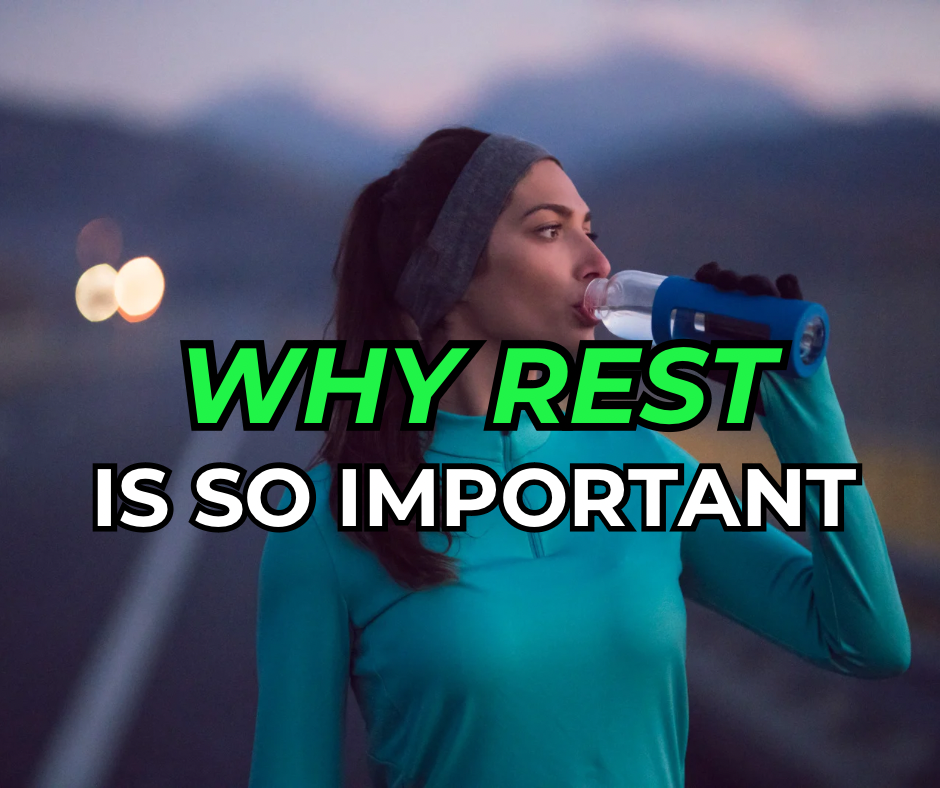Why Is Rest So Important?
The Power of Rest: Why It’s Crucial for Your Fitness Journey
Rest is more than just a break from your workout routine; it’s a vital component that supports both your physical and mental well-being. Many of us are driven by the idea that more gym time equals better results. However, it’s actually rest that plays a key role in helping you reach your peak performance.
Why do you need rest?
Essential for Muscle Growth
When you exercise, your body experiences physical stress that can lead to muscle breakdown. For your muscles to grow, they need time to recover and rebuild. This recovery phase, also known as muscular hypertrophy, is crucial for seeing progress and muscle growth. Without adequate rest, your muscles can’t complete this rebuilding process, which means you won’t achieve the results you’re aiming for.
Mental Health Matters
Rest isn’t just about physical recovery; it’s also essential for your mental health. While endorphins from a good workout can lift your mood, overtraining can lead to irritability, poor sleep, reduced performance, and a loss of appetite. This mental exhaustion can affect your decision-making during workouts, increasing the risk of injury. Taking time to rest helps keep your mind sharp and focused.
Replenishing Energy Stores
Your muscles store energy in the form of glycogen. Intense exercise depletes these stores, leading to muscle fatigue. Rest days are crucial for replenishing glycogen levels, ensuring your muscles are recharged and ready for your next workout session. This recovery helps prevent fatigue and keeps you performing at your best.
Identifying the Signs and Understanding Rest Days
If you’re pushing hard in your workouts but not seeing the progress you expect, or if you’re feeling off, you might not be getting enough rest. Here are six signs that could indicate you’re in need of more rest.
Here are six signs that could indicate you are not getting enough rest:
- Persistent Muscle Pain or Soreness: If your muscles are consistently sore, it might be a sign that they haven’t had enough time to recover.
- Feelings of Sluggishness: A constant sense of fatigue can indicate that your body isn’t getting the rest it needs.
- Inability to Complete a Workout: Struggling to finish your usual routine could mean you’re overtrained and need a break.
- Increased Injury Occurrence: Frequent injuries can be a red flag that your muscles and joints are not getting adequate rest.
- Mood Changes: Experiencing irritability, insomnia, or mood swings can be linked to insufficient recovery.
- Stalled Progress: If your performance or results have plateaued, it might be time to evaluate your rest strategy.
If you are experiencing any of these signs, try incorporating a little rest into your regime and see if improvements are made.
What is a rest day?
Rest days are defined as a day when you take a break from your regular exercise regime. Usually, people do not partake in any exercise on their rest days; however, if an individual is not injured or exhausted, they may have an ARD (active recovery day).
On an ARD, you may engage in light activity that is less intense than usual, including yoga, walking, foam rolling or stretching. Active recovery days aid recovery by helping blood flow and, therefore, oxygen and nutrients to the muscles so they can repair themselves
Active Recovery Days are great for when you don’t want to do an intense session but still feel like moving your body.
How much rest do you need?
The amount of rest you require depends on the intensity and type of exercise you’re doing, as well as your overall lifestyle. For light exercises, you might not need designated rest days. However, for moderate to vigorous activities, incorporating rest days is essential to allow your body to recover fully.
It is recommend including muscle-strengthening activities in your regime at least two days per week. So, as an example you could be training approx. 3 hours of moderate activity an average which ranges from gym workout, running, biking, swimming etc, you may do 30-minute sessions six days a week, followed by one rest day or active recovery day.
It is important that you incorporate at least one rest day into your workout week, especially if you are engaging in vigorous exercise.
Give your body the chance to recover and rebuild.
What to eat on a rest day
It is still important to eat a balanced diet these days. Protein is essential for recovery as it acts as building blocks for our bodies and is necessary for muscles to be repaired following exercise; therefore, ensuring adequate protein intake is highly beneficial.
Orbit Nutrition Grass Fed WHEY is an excellent supplement for those rest days & training days, providing you with 23g of quality protein in one serving! Have it in a shake or use it in baking to create a high-protein treat such as protein balls or bars. Our Protein Orbs are a convenient, high-protein snack that will help you reach your protein targets on those on-the-go rest days!
Key Takeaways
- Rest is an integral part of your fitness regime and is essential for muscle growth, mental health and replenishing glycogen stores.
- If you still feel like moving your body on a rest day, engage in an active rest day by partaking in a low-intensity workout.
- Ask yourself if you are experiencing any of the six signs of overtraining and decide whether you need to take a rest day when you feel your body needs it.
